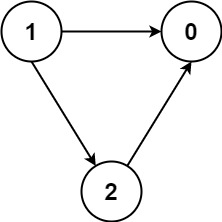1558. Course Schedule Iv¶
Difficulty: Medium
LeetCode Problem View on GitHub
1558. Course Schedule IV
Medium
There are a total of numCourses courses you have to take, labeled from 0 to numCourses - 1. You are given an array prerequisites where prerequisites[i] = [ai, bi] indicates that you must take course ai first if you want to take course bi.
- For example, the pair
[0, 1]indicates that you have to take course0before you can take course1.
Prerequisites can also be indirect. If course a is a prerequisite of course b, and course b is a prerequisite of course c, then course a is a prerequisite of course c.
You are also given an array queries where queries[j] = [uj, vj]. For the jth query, you should answer whether course uj is a prerequisite of course vj or not.
Return a boolean array answer, where answer[j] is the answer to the jth query.
Example 1:

Input: numCourses = 2, prerequisites = [[1,0]], queries = [[0,1],[1,0]] Output: [false,true] Explanation: The pair [1, 0] indicates that you have to take course 1 before you can take course 0. Course 0 is not a prerequisite of course 1, but the opposite is true.
Example 2:
Input: numCourses = 2, prerequisites = [], queries = [[1,0],[0,1]] Output: [false,false] Explanation: There are no prerequisites, and each course is independent.
Example 3:

Input: numCourses = 3, prerequisites = [[1,2],[1,0],[2,0]], queries = [[1,0],[1,2]] Output: [true,true]
Constraints:
2 <= numCourses <= 1000 <= prerequisites.length <= (numCourses * (numCourses - 1) / 2)prerequisites[i].length == 20 <= ai, bi <= numCourses - 1ai != bi- All the pairs
[ai, bi]are unique. - The prerequisites graph has no cycles.
1 <= queries.length <= 1040 <= ui, vi <= numCourses - 1ui != vi
Solution¶
class Solution {
public List<Boolean> checkIfPrerequisite(int n, int[][] prerequisites, int[][] queries) {
int[] indegree = new int[n];
Map<Integer, Set<Integer>> adj = new HashMap<>();
Map<Integer, Set<Integer>> prerequisitesMap = new HashMap<>();
for (int i = 0 ; i < n; i++) {
prerequisitesMap.put(i, new HashSet<>());
adj.put(i, new HashSet<>());
}
for (int[] pre : prerequisites) {
indegree[pre[1]]++;
adj.get(pre[0]).add(pre[1]);
}
Queue<Integer> queue = new LinkedList<>();
for (int i = 0; i < n; i++) {
if (indegree[i] == 0) queue.offer(i);
}
while (!queue.isEmpty()) {
int node = queue.poll();
Set<Integer> set = adj.get(node);
for (int next : set) {
prerequisitesMap.get(next).add(node);
prerequisitesMap.get(next).addAll(prerequisitesMap.get(node));
indegree[next]--;
if (indegree[next] == 0) queue.offer(next);
}
}
List<Boolean> res = new ArrayList<>();
for (int[] pair : queries) {
Set<Integer> set = prerequisitesMap.get(pair[1]);
if (set.contains(pair[0])) res.add(true);
else res.add(false);
}
return res;
}
}
Complexity Analysis¶
- Time Complexity:
O(?) - Space Complexity:
O(?)
Approach¶
Detailed explanation of the approach will be added here